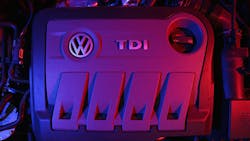German Report: VW Reaches Deal with US Authorities
FRANKFURT — Volkswagen appears to have struck a deal with U.S. authorities over compensation for car owners in its massive engine-rigging scandal, according to a newspaper report Thursday, sending VW shares soaring on the Frankfurt stock exchange.
The German daily Die Welt reported that VW had agreed to pay $5,000 to each owner in the United States of a car fitted with the suspect software that skews the emissions of its diesel engine. On top of this, VW would foot the bill for refitting each engine, the newspaper said. Some 600,000 vehicles in the United States are involved.
According to other media reports, VW might even repurchase the affected cars from their owners.
The speculation sent VW’s shares soaring 7.5% to an intraday high of 130 euros on the Frankfurt stock market on Thursday, after they already jumped by more than six percent the day before. In early afternoon, the shares were showing a gain of 5.6% in a slightly softer overall market.
Neither VW nor the Justice Department or the Environmental Protection Agency were willing to comment on the report. But a judge in San Francisco had given both sides until midnight on Thursday to reach an agreement, otherwise it would have gone to trial.
Die Welt said that a detailed plan for refitting the engines of the vehicles affected in the U.S. had not yet been drawn up. The full details of the compensation and fines facing the German group had not yet been worked out.
“It’s more a broad framework defining the key points which will be worked out and finalized in the coming months,” the newspaper quoted an informed source as saying.
Bloomberg Business News reported that VW had agreed to set aside “at least $10 billion” to resolve civil claims by the U.S. government and lawsuits by US car owners.
VW is battling to emerge from its deepest-ever crisis into which it was plunged last September when it came to light that the carmaker had installed emissions-cheating software into 11 million diesel engines worldwide.
The crisis led to the departure of CEO Martin Winterkorn and caused VW to delay releasing its 2015 earnings due to uncertainty over the costs of the scandal, which are expected to run into many billions of euros. It has already set aside six billion euros in provisions, but the final sum is expected to be much higher.
The German giant, which has abandoned its ambitions of becoming the world’s biggest carmaker ahead of Toyota in the wake of the scandal, has already started recalling some eight million vehicles affected in Europe. The scandal has greatly tarnished the reputation of a company once regarded as a paragon of German industry, even if group unit sales already seem to have stabilized.
The recall operation in Europe is expected to take all year. And while VW is footing the bill, it is not expecting to have to pay European owners compensation, much to the chagrin of consumer protection groups. Negotiations with the US authorities have proven much tougher than in Europe.
VW’s supervisory board is scheduled to meet Friday to approve the carmaker’s 2015 accounts, the publication of which has been delayed as the group struggles to tot up the cost of the so-called “Dieselgate” affair.
Another bone of contention in Germany recently has been the question whether VW’s top executives should be entitled to their normally very generous annual bonuses in the wake of the scandal.
By Simon Morgan
About the Author
Bloomberg
Licensed content from Bloomberg, copyright 2016.
